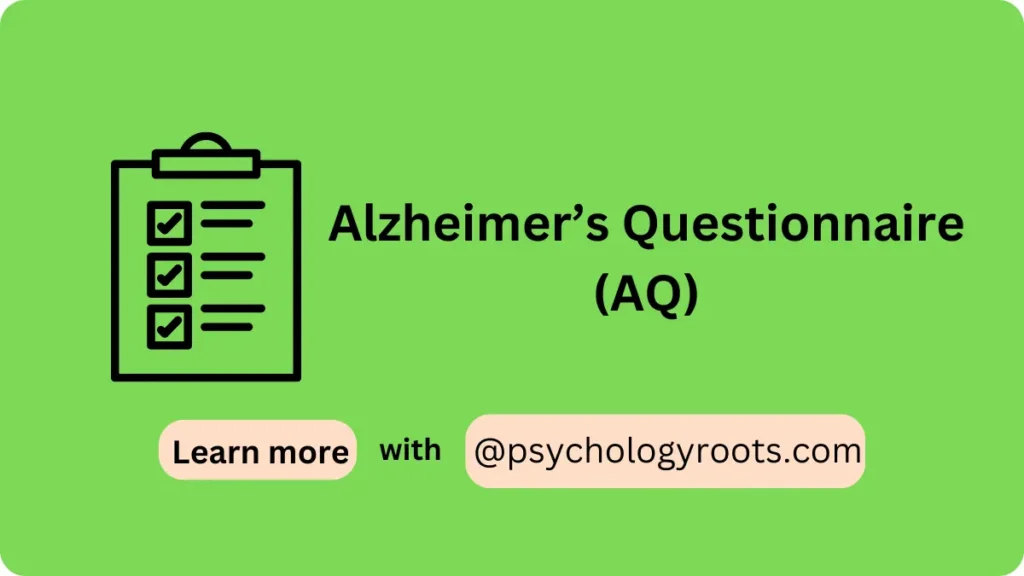Table of Contents
Alzheimer’s Questionnaire (AQ)
Here in this post, we are sharing the “Title”. You can read psychometric and Author information. We have thousands of Scales and questionnaires in our collection (See Scales and Questionnaires). You can demand us any scale and questionnaires related to psychology through our community, and we will provide you with a short time. Keep visiting Psychology Roots.
About Alzheimer’s Questionnaire (AQ)
Scale Name
Alzheimer’s Questionnaire (AQ)
Author Details
Dr. Michael Malek-Ahmadi
Translation Availability
Not Sure

Background/Description
The Alzheimer’s Questionnaire (AQ) is a brief, evidence-based screening tool used primarily in primary care settings to recognize, diagnose, and manage cognitive impairment, with a particular focus on Alzheimer’s disease. Developed by Dr. Michael Malek-Ahmadi and his colleagues, the AQ is designed to quickly assess the presence of symptoms associated with Alzheimer’s disease and other forms of dementia.
The AQ is unique in that it relies on informant-based reporting, meaning it is completed by someone who knows the patient well, such as a family member or caregiver. This approach allows the AQ to capture a wide range of cognitive and behavioral changes that may not be apparent during a clinical evaluation. The questionnaire consists of 21 items, divided into five domains: memory, orientation, functional abilities, visuospatial abilities, and language. Each item is weighted according to its relevance to Alzheimer’s disease, with the total score indicating the likelihood of cognitive impairment.
The AQ is a valuable tool in primary care because it is quick to administer, taking only 2-5 minutes, and provides a reliable indication of whether further diagnostic testing is needed. The tool is particularly useful for identifying patients who may benefit from early intervention, which can significantly impact the progression and management of Alzheimer’s disease.
Administration, Scoring and Interpretation
- Informant Selection: Identify a knowledgeable informant, such as a close family member or caregiver, who can accurately report on the patient’s cognitive and behavioral status.
- Questionnaire Completion: The informant completes the 21-item questionnaire, answering each question based on their observations of the patient’s cognitive functioning.
- Scoring: Each item is scored, with some items carrying more weight based on their association with Alzheimer’s disease. The total score is calculated, with higher scores indicating a greater likelihood of cognitive impairment.
- Interpretation: The total score is interpreted by a healthcare professional. A score of 15 or higher is suggestive of Alzheimer’s disease and warrants further evaluation.
Reliability and Validity
The Alzheimer’s Questionnaire has been shown to have strong reliability and validity as a screening tool for Alzheimer’s disease and other forms of dementia. The internal consistency of the AQ is high, with a Cronbach’s alpha of 0.85, indicating that the items on the questionnaire are measuring the same underlying construct. The test-retest reliability is also robust, ensuring consistent results over time.
In terms of validity, the AQ has demonstrated good sensitivity (89%) and specificity (96%) in detecting Alzheimer’s disease. The questionnaire’s construct validity is supported by its correlation with other established measures of cognitive impairment, such as the Mini-Mental State Examination (MMSE) and the Montreal Cognitive Assessment (MoCA). Its predictive validity has also been confirmed through longitudinal studies that show the AQ can accurately identify individuals who are at risk for developing Alzheimer’s disease.
Available Versions
21-Items
Reference
Malek-Ahmadi, M., & Sabbagh, M. N. (2015). Development and Validation of the Alzheimer’s Questionnaire (AQ). Journal of nature and science, 1(5), e104.
Important Link
Scale File:
Frequently Asked Questions
Q: Who should complete the Alzheimer’s Questionnaire?
A: The AQ should be completed by someone who knows the patient well, such as a family member or caregiver, as it relies on informant-based reporting.
Q: How long does it take to administer the AQ?
A: The AQ typically takes 2-5 minutes to complete.
Q: What does a high AQ score indicate?
A: A high AQ score (15 or above) suggests a higher likelihood of Alzheimer’s disease or other forms of cognitive impairment and indicates the need for further diagnostic evaluation.
Q: Is the AQ used for diagnosing Alzheimer’s disease?
A: While the AQ is a valuable screening tool, it is not diagnostic on its own. It identifies individuals who may need further testing to diagnose Alzheimer’s disease.
Q: Can the AQ be used in non-clinical settings?
A: The AQ is designed for use in primary care and clinical settings, but it can also be used in research to screen for cognitive impairment in populations at risk for Alzheimer’s disease.
Disclaimer
Please note that Psychology Roots does not have the right to grant permission for the use of any psychological scales or assessments listed on its website. To use any scale or assessment, you must obtain permission directly from the author or translator of the tool. Psychology Roots provides information about various tools and their administration procedures, but it is your responsibility to obtain proper permissions before using any scale or assessment. If you need further information about an author’s contact details, please submit a query to the Psychology Roots team.
Help Us Improve This Article
Have you discovered an inaccuracy? We put out great effort to give accurate and scientifically trustworthy information to our readers. Please notify us if you discover any typographical or grammatical errors.
Make a comment. We acknowledge and appreciate your efforts.
Share With Us
If you have any scale or any material related to psychology kindly share it with us at psychologyroots@gmail.com. We help others on behalf of you.